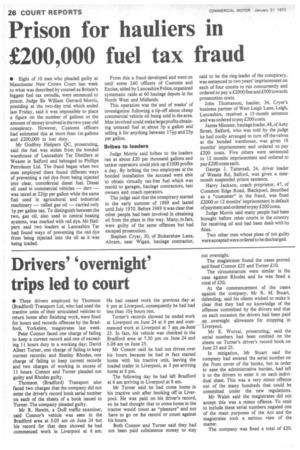Prison for hauliers in £200,000 fuel tax fraud
Page 28

If you've noticed an error in this article please click here to report it so we can fix it.
• Eight of 10 men who pleaded guilty at .Manchester New Crown Court last week to what was described by counsel as Britain's biggest fuel tax swindle, were sentenced to prison. Judge Sir William Gerrard Morris, presiding at the two-day trial which ended last Friday, said it was impossible to place a figure on the number of gallons or the amount of money involved in the two-year-old conspiracy. However, Customs officers had estimated this at more than lm gallons and £200,000 in lost duty.
Mr Godfrey Heilpern QC, prosecuting, said the fuel was stolen from the bonded warehouse of Lancashire Tar Distillers at Weaste in Salford and belonged to Phillips Petroleum Ltd. The fraud began when two men employed there found different ways of preventing a red dye from being injected into clear, comm'ercial diesel fuel. Diesel oil used in commercial vehicles — dery — was taxed at 22-1-p per gallon while the same fuel used in agricultural and industrial machinery — called gas' oil — carried only lp per gallon tax. To distinguish between the two, gas oil, also used in central heating systems, was marked with red dye. Mr Heilpern said two loaders at Lancashire Tar had found ways of preventing the red dye from being injected into the oil as it was being loaded. From this a fraud developed and went on until some 240 officers of Customs and Excise, aided by Lancashire Police, organized systematic raids at 60 haulage depots in the North West and Midlands.
This operation was the end of weeks' of investigation following a tip-off about cheap commercial vehicle oil being sold in the area. Men involved could make large profits obtaining untaxed fuel at about 5p a gallon and selling it for anything between l7--p and 25p per gallon.
Bribes to loaders
Judge Morris said bribes to the loaders ran at about £20 per thousand gallons and tanker operators could pick up £1000 profits a day. By bribing the two employees at the bonded installation the accused were able to obtain virtually tax-free fuel which was resold to garages, haulage contractors, taxi owners and coach operators.
The judge said that the conspiracy started in the early summer of 1969 and lasted until July 1970. Before 1969 it was clear that other people had been involved in obtaining oil from the plant in this way. Many, in fact, were guilty. of the same offences but had escaped prosecution.
Stephen Cryer, 30, of Bickershaw Lane, Abram, near Wigan, haulage contractor, said to be the ring-leader of the conspiracy, was sentenced to two years' imprisonment on each of four counts to run concurrently and ordered to pay a2000 fine and £500 towards prosecution costs.
John Thomasson, haulier, 36, Cryer's business partner of West Leigh Lane, Leigh, Lancashire, received a I5-month sentence and was ordered to pay £200 costs.
James Minister, haulage loader, 48, of Amy Street, Salford, who was told by the judge he had coolly arranged to turn off the valves at the bonded warehouse, was given 18 months' imprisonment and ordered to pay £200 costs. Five others were sentenced to 12 months imprisonment and ordered to pay £200 costs each.
George J. Tattersall, 24, driver loader of Weaste Rd, Salford, was given a ninemonth suspended prison sentence.
Harry Jackson, coach proprietor, 47, of Common Edge Road, Blackpool, described as a "customer" in the fraud, was fined £2000 or 12 months' imprisonment in default of payment and ordered to pay £200 costs.
Judge Morris said many people had been brought before other courts in the country for receiving oil and had been dealt with by fines.
Two other men whose pleas of not guilty were accepted were ordered to be discharged.










































































































